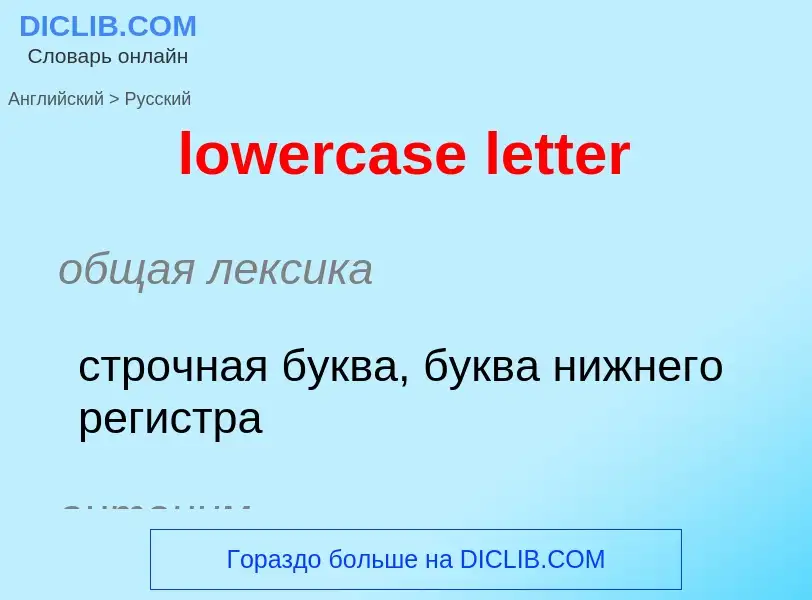Μετάφραση και ανάλυση λέξεων από την τεχνητή νοημοσύνη ChatGPT
Σε αυτήν τη σελίδα μπορείτε να λάβετε μια λεπτομερή ανάλυση μιας λέξης ή μιας φράσης, η οποία δημιουργήθηκε χρησιμοποιώντας το ChatGPT, την καλύτερη τεχνολογία τεχνητής νοημοσύνης μέχρι σήμερα:
- πώς χρησιμοποιείται η λέξη
- συχνότητα χρήσης
- χρησιμοποιείται πιο συχνά στον προφορικό ή γραπτό λόγο
- επιλογές μετάφρασης λέξεων
- παραδείγματα χρήσης (πολλές φράσεις με μετάφραση)
- ετυμολογία
lowercase letter - translation to Αγγλικά
общая лексика
строчная буква, буква нижнего регистра
антоним
Ορισμός
Название буквы древней славянской или старой русской азбуки.
Βικιπαίδεια
Letter case is the distinction between the letters that are in larger uppercase or capitals (or more formally majuscule) and smaller lowercase (or more formally minuscule) in the written representation of certain languages. The writing systems that distinguish between the upper and lowercase have two parallel sets of letters, with each letter in one set usually having an equivalent in the other set. The two case variants are alternative representations of the same letter: they have the same name and pronunciation and are treated identically when sorting in alphabetical order.
Letter case is generally applied in a mixed-case fashion, with both upper and lowercase letters appearing in a given piece of text for legibility. The choice of case is often prescribed by the grammar of a language or by the conventions of a particular discipline. In orthography, the uppercase is primarily reserved for special purposes, such as the first letter of a sentence or of a proper noun (called capitalisation, or capitalised words), which makes the lowercase the more common variant in regular text.
In some contexts, e.g., academic, it is conventional to use one case only. For example, engineering design drawings are typically labelled entirely in uppercase letters, which are easier to distinguish individually than the lowercase when space restrictions require that the lettering be very small. In mathematics, on the other hand, uppercase and lower case letters denote generally different mathematical objects, which may be related when the two cases of the same letter are used; for example, x may denote an element of a set X.

![[[Handwritten]] Cyrillic script [[Handwritten]] Cyrillic script](https://commons.wikimedia.org/wiki/Special:FilePath/Fountain pen writing (literacy).jpg?width=200)
![theory of general relativity]].) theory of general relativity]].)](https://commons.wikimedia.org/wiki/Special:FilePath/Headline.png?width=200)
